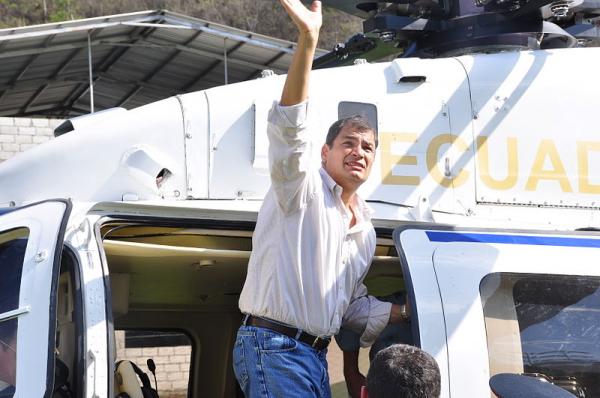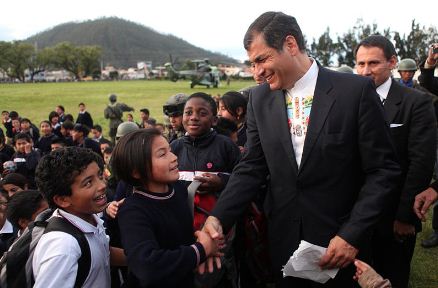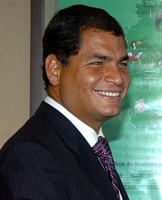.jpg) Ecuador's President Rafael Correa stated in an interview this month that his government would consider granting political asylum to Syrian head-of-state Bashar al Assad. President Assad is reportedly mulling asylum for himself, his family members, and close associates, in the event that he is forced to flee Damascus as the bloody civil war in his country escalates.
Ecuador's President Rafael Correa stated in an interview this month that his government would consider granting political asylum to Syrian head-of-state Bashar al Assad. President Assad is reportedly mulling asylum for himself, his family members, and close associates, in the event that he is forced to flee Damascus as the bloody civil war in his country escalates.
Sources state that, in a bid to explore the possibility of asylum, Syria's Deputy Foreign Minister, Faisal al Miqdad, recently traveled to Ecuador, Venezuela, and Cuba, bearing letters from Assad to the President of each country.
Correa confirmed that Miqdad visited Quito in late November, but said that the purpose of the trip was to thank Correa's administration for its "objective stance" regarding the conflict in Syria. Both Ecuador's President and his Foreign Minister denied reports that Assad had requested political asylum. However, since then Correa has spoken out regarding the possibility of hosting Assad, saying:
"Any person that requests asylum in Ecuador, obviously we are going to consider as a human being whose basic rights we have to respect … Can we believe all those news stories on violence, the dictator? Let's remember what was said about Iraq."
 Controversy erupted earlier this week after the journalism department of Argentina's National University of La Plata awarded Ecuadorean President Rafael Correa the Rodolfo Walsh Prize for freedom of expression. Proponents of media freedom have harshly criticized Correa for his treatment of the Ecuadorean press. But such criticisms fail to acknowledge the reasons underlying the media policies of President Correa, whose government recently granted political asylum to government transparency advocate and WikiLeaks Editor-in-Chief Julian Assange.
Controversy erupted earlier this week after the journalism department of Argentina's National University of La Plata awarded Ecuadorean President Rafael Correa the Rodolfo Walsh Prize for freedom of expression. Proponents of media freedom have harshly criticized Correa for his treatment of the Ecuadorean press. But such criticisms fail to acknowledge the reasons underlying the media policies of President Correa, whose government recently granted political asylum to government transparency advocate and WikiLeaks Editor-in-Chief Julian Assange.

The South American media has reverberated lately with reports that the CIA has been using drug money in efforts to destabilize the government of Ecuador's President, Rafael Correa. If these stories are accurate, then the plan's exposure and apparent failure may illustrate the impotence of traditional U.S. interventionism in the new South America, which increasingly rejects traditional political and economic servitude to its northern and European neighbors.
 "Catbird seat", noun: "an advantageous situation or condition"; "sitting pretty". This North American idiom readily applies to the current position of Ecuadorean President Rafael Correa, who was hoisted into the international spotlight when he recently became host to Julian Assange. As a result Correa has raised the global profile of his small nation of 14 million, and the tens of thousands of letters received by his embassy in the past ten days indicate that granting Assange asylum would instantly make him a global hero. With little economic dependence on the U.S., and with Assange at his disposal, Correa potentially holds significant leverage over Washington.
"Catbird seat", noun: "an advantageous situation or condition"; "sitting pretty". This North American idiom readily applies to the current position of Ecuadorean President Rafael Correa, who was hoisted into the international spotlight when he recently became host to Julian Assange. As a result Correa has raised the global profile of his small nation of 14 million, and the tens of thousands of letters received by his embassy in the past ten days indicate that granting Assange asylum would instantly make him a global hero. With little economic dependence on the U.S., and with Assange at his disposal, Correa potentially holds significant leverage over Washington.
Theme by Danetsoft and Danang Probo Sayekti inspired by Maksimer